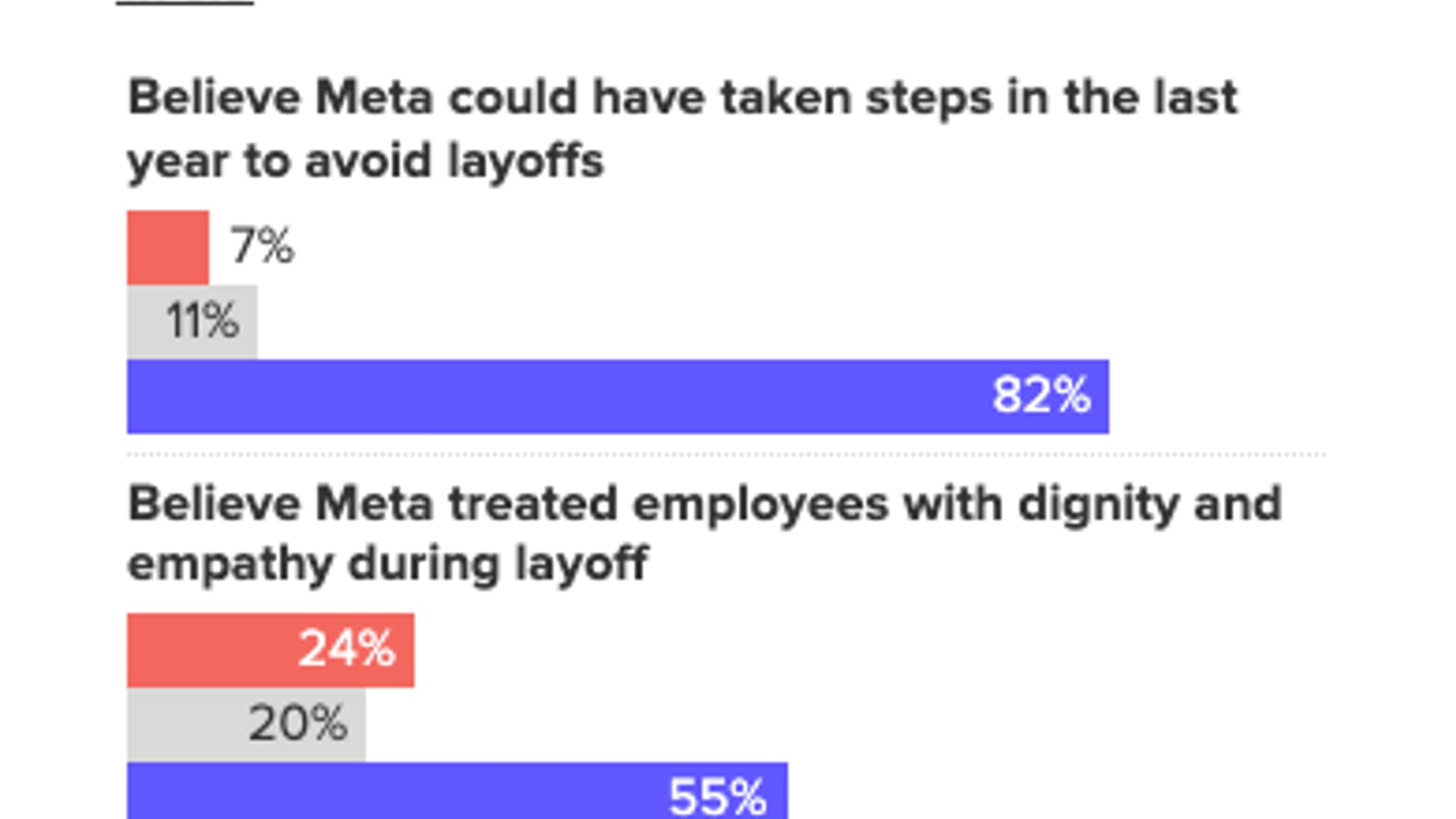
For decades, Silicon Valley tech darlings like Google, Apple, Facebook and Twitter set the gold standard of making it in the tech space. Employees wanted to work for innovative leaders, enjoy vast campuses that catered to their every need and use their talents to build some of the most influential technology in the world.
But the last several years, and especially the pandemic, have begun to show the cracks in the facade to unveil each company's shortcomings, from data leaks to worker mistreatment lawsuits to leadership tumult.
And with the latest round of layoffs from the likes of Twitter, Meta and Amazon within a matter of weeks, it could be enough to tarnish the once-lauded dream companies seemingly everyone wanted to work for.
For example, after Twitter laid off 3,700 employees on Nov. 4, 11% of remaining employees said they believe the company will succeed under Elon Musk's management, according to a survey of 442 U.S. Twitter workers on Blind, the anonymous employee discussion board, from Nov. 7 to 10. (Blind users must provide their work email email address, job title and employer when joining the platform, and are occasionally sent prompts to re-verify their accounts.)
Get Tri-state area news and weather forecasts to your inbox. Sign up for NBC New York newsletters.
Just 2% would recommend Twitter as an employer to their friends, and 1% believe the company treated employees with dignity and empathy during the layoff.
After Meta cut 11,000 employees on Nov. 9, 31% of remaining employees said they would recommend their employer to a friend, and 55% believe the company acted with care during the layoff, according to a survey of 1,179 U.S Meta workers on Blind from Nov. 10 to 11.
Beyond public scrutiny and scandal, layoff news could have an outsized impact on whether people say a certain company is a good place to work, and the latest round of dramatic cuts could indicate that Silicon Valley's Big Tech darlings are losing their luster.
Money Report
Companies face 'reputational risk' during layoffs
Layoffs create a clear "reputational risk" and "employer brand hit," says Rick Chen, head of PR for Blind.
He uses Snap as an example, which laid off 20% of its staff, or roughly 1,000 people, in August.
Prior to the layoffs, anywhere between 75% to 85% of surveyed Snap employees said they'd recommend their employer to a friend. After layoffs, however, that confidence dropped to 30% of Snap employees who would recommend their employer to a friend.
"Clearly layoffs changed the perception of Snap as a choice employer," Chen says, "and we see that same trend throughout large companies. We're seeing layoffs have a large impact on the employer brand they've built up over time."

An employer's brand reputation is a big deal for tech workers who know their skills are in-demand: Nearly 90% say an employer's brand is important when they're considering a new job, and nearly 80% wouldn't apply to a higher-paying job at a company with a bad reputation, according to a July survey of 950 people by Dice, a career site for tech workers.
It's also not just about the layoffs themselves, but how they're handled, Chen says. Do laid-off employees get severance? Was the news communicated in a timely and clear way? Did employees feel they were treated with empathy?
Leaders only have one shot to get it right, too. "We've seen some investors recommend, if you're going to have a layoff, do it once, make it deep and just have that be it," Chen says. "Looking at the reactions on Blind, I would say that advice bears out."
He points to Robinhood as an example, which cut 9% of its staff in April and then another 23% by August.
"By the second round of layoffs, their reputation hadn't even recovered from the first," Chen says, adding that Blind has not conducted a follow-up survey to see if employee sentiment has rebounded.
The 'tides are changing' around what's considered the 'gold standard' of tech jobs
In the last decade or two, "having a company name like Google, Microsoft or Amazon on your resume has been the gold standard" for tech workers, says Art Zeile, CEO of Dice. "There's no question about that."
These days, however, the "tides are changing" around what employees want beyond name recognition. One shift: A Dice survey shows roughly 60% of tech workers want to work from home 100% of the time, even as many companies renewed return-to-office efforts this year.
Throughout the Covid-19 pandemic, tech workers have left costly areas around Silicon Valley, Seattle and New York City, Zeile says, and instead headed to growing cities where their tech salaries stretch further, like Austin, Texas; Salt Lake City; or Charlotte, N.C.
"The combination of layoffs and certain companies with the old-school mentality around working in the office — their reputation is going to be harmed, and there's not going to be that interest among the tech crowd," Zeile says. Thanks to widespread remote work, he says people are realizing "you don't have to be in Silicon Valley to have a great technology career."
Companies from Google to Meta are also cutting lavish campus perks, like free food and laundry services, that have become synonymous with the Silicon Valley work experience.
Without the fun extras, companies will have to win workers over by offering job security, opportunities to learn, and the ability to make an impact, which tech workers are increasingly prioritizing, Chen says.
So far, as some companies face turmoil in recent weeks, Google, Atlassian, Salesforce and TikTok remain "employers of choice" among tech workers on Blind.
"Some of these Disneyland-esque amenities are certainly going away," Chen says, "but at the end of the day, many tech professionals communicate on Blind that they're currently interested in joining some of these tech companies because of the mission, and the scale and impact they're able to accomplish with the work."
Despite layoffs, tech workers still have a lot of options
Whether in the tech industry or elsewhere, demand for workers with technology skills remains sky-high. As of October, there were 317,000 open tech jobs in the U.S. — higher than the roughly 200,000 to 250,000 open tech jobs posted per month prior to the pandemic, Zeile says.
Most employers he works with say it's still incredibly hard to hire for certain roles, especially in data science, cybersecurity or cloud engineering, and that recruiters are looking to scoop up workers impacted by layoffs.
The success of companies going through layoffs could come down to how risky tech job seekers are willing to be, despite recession concerns, says Daphne E. Jones, a longtime tech executive and founder of The Board Curators, a consultancy that prepares senior leaders to serve on paid boards. "If job security is what you want, you can be a huge fish in a small pond" and take your Big Tech credentials to work in a company outside the technology sector, she says. "But if innovation is your thing, [Big Tech] companies haven't lost their luster."
Overall, despite the dramatic headlines, Chen says, "employees still have choices. Professionals are still discussing making career moves amid this uncertainty. There's certainly employers out there benefiting from being able to demonstrate they're a stable employer, and that shows the importance of the employer brand that companies have either built up and retained — or not managed well at all."
Want to earn more and work less? Register for the free CNBC Make It: Your Money virtual event on Dec. 13 at 12 p.m. ET to learn from money masters like Kevin O'Leary how you can increase your earning power.
Check out:
Thousands of tech workers lost jobs this week—the shock could ripple through the economy
Sharing your layoff on LinkedIn isn't an 'act of shame' anymore—and it could be a smart career move
Hiring is still booming in some industries, but falling in others—and job seekers are worried






